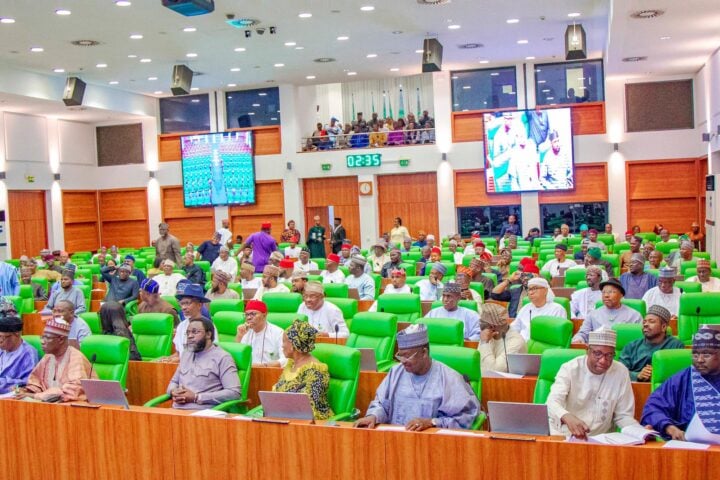The house of representatives, on Tuesday, made various approvals on the country’s 2024-2026 medium-term expenditure framework (MTEF) and fiscal strategy paper (FSP).
The approvals were made in a report presented by James Faleke, chairman, committee on finance, national planning and economic development loans and debt management.
According to the report, the house of representatives approved that the subsidiaries of the Nigerian Postal Service (NIPOST) be closed and deregistered, deeming their establishment to be irregular and illegal.
The lower chamber also approved that the Bureau of Public Enterprises (BPE) Act be amended to remove the clause(s) that create conflict between it and the ministry of finance incorporated (MOFI).
Advertisement
The lawmakers approved “MOFI should be the authorized custodian of all Federal Government assets, both liquid and physical”.
Here are five recommendations by the house of representatives.
REPS APPROVE 2024-2026 MTEF
Advertisement
The house of representatives approved the 2024-2026 MTEF and FSP.
The house of representatives maintained the ancillary parameters in the MTEF/FSP document for 2024–2026, as follows:
° Spending N26 trillion, with N16.9 trillion in retained revenue.
° N9 trillion budget deficit.
Advertisement
° N7.8 trillion in new borrowings (including borrowing from foreign and domestic sources).
° N1.3 trillion worth of statutory transfers.
° An estimated N8.2 trillion in debt service.
° N243.6 billion in the sinking fund.
Advertisement
° N1.27 trillion in pension, gratuity, and retiree benefits.
° Total recurrent (non-debt) of N10.2 trillion, and personnel costs (MDAs) of N4.49 trillion.
Advertisement
° Capital expenditure (exclusive of transfers) of N5.9 trillion.
° Special intervention (recurrent) of N200 billion, and special intervention (capital) of N7 billion comprising the aggregate FG expenditure of N26 trillion.
Advertisement
REPS APPROVES $73.96 OIL BENCHMARK FOR 2024
Oil price benchmarks of $73.96, $73.76, and $69.90 per barrel for 2024, 2025, and 2026 respectively, were also approved by the house.
Advertisement
Also, the lower chamber approved the daily crude oil production of 1.78 million barrels per day (bpd), 1.80 million bpd, and 1.81 million bpd, for 2024, 2025, and 2026, respectively.
The production volume, the house said, is subject to the Nigerian National Petroleum Company (NNPC) Limited confirmation of actual and verifiable deliveries.
The house also approved the exchange rate of N700/$, N665.61/$, and N669.79/$ proposed by the executive for the periods 2024-2026 “due to federal government’s vigorous drive to enhance local production (both oil and non-oil) for increased foreign reserve growth”.
REPS OKAY GDP GROWTH, INFLATION RATES
The house of representatives approved a growth rate of 3.76 percent for next year.
For 2025 and 2026, the GDP growth rates of 4.22 percent, and 4.78 percent were approved by the lower chamber.
According to the house, this is in light of the federal government’s response to fiscal measures to stimulate the economy through significant investment in infrastructure, small and medium-sized enterprises (SMEs), and the agricultural sector,
The house of representatives approved an inflation rate of 21.40 percent, 20.30 percent, 18.60 percent for 2024, 2025 and 2026, respectively.
‘TAX WAIVERS FROM 2015 TO DATE SHOULD BE INVESTIGATED’
The federal government had said it plans to review tax waivers given to companies operating in Nigeria.
Taiwo Oyedele, chairman of the presidential tax reform committee, said the incentives gulp N6 trillion every year.
Commenting on the issue, the house of representatives directed all tax waivers from 2015 to date should be investigated by the relevant committee of the house.
The house also proposed that all tax waivers not directly linked to non-governmental/non-profit organisations should not be granted.
The lower chamber recommended that all items locally produced should be outrightly banned from importation and customs tariffs be amended accordingly.
It also directed the Central Bank of Nigeria (CBN) to ensure that banks have access to forex to provide funds to importers and other users to prevent patronage of the parallel market.
Add a comment






